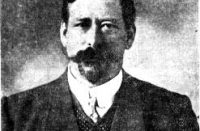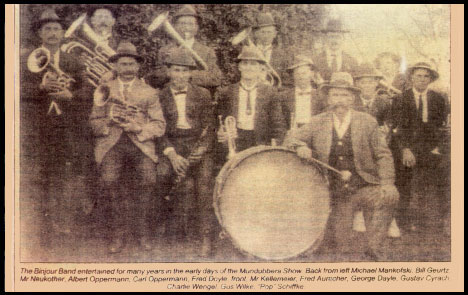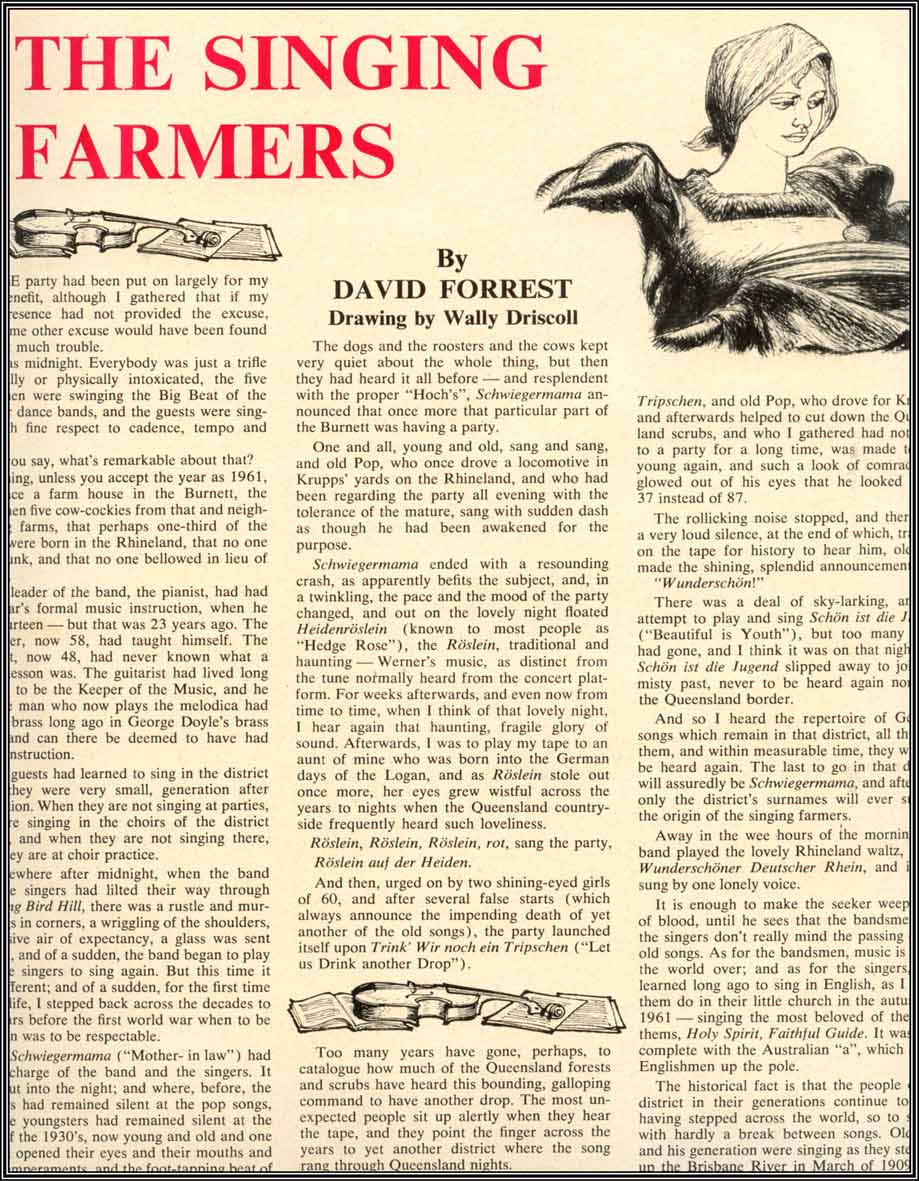David Forrest and the ‘Lost’ Tapes of Binjour
Photograph of Binjour German settlers brass band
Many years ago whilst staying in the Gayndah and Munduberra districts I contacted Vera Wolf in Munduberra when searching for German songs in the Burnett district. Vera informed me that many years previously a young man by the name of David Denholm, who had the ‘pen name’ of David Forrest, had visited and stayed with relatives on nearby Binjour Plateau. As a young bank worker David had published an award winning book entitled ‘The Last Blue Sea’ – a semi-autobiographical fictional work about his life-changing war experiences as a very young soldier fighting the Japanese forces in the mountainous jungles of New Guinea. Over the years David published a number of short stories relating to the German pioneer settlers in the Burnett district. These stories included ‘That Barambah Mob’, about a mythical South Burnett cricketer called Henry Stulpnagel who remembered the feats of Aboriginal demon fast bowler Eddie Gilbert.
In addition Vera suggested I track down an article entitled ‘The Singing Farmers’ which was a vivid description of a musical evening amongst the German-Queensland pioneering farmers of the Burnett district which was published in the well-known Aussie magazine Walkabout in August 1962. I soon after located the article in the State Library of Queensland and was delighted at the contents that described the musical evening in great detail – probably the best writing on the ‘lost’ German-Queensland culture I had yet discovered.
The following extracts are from that evocative and moving article written by David Forrest (Denholm) and provide a glimpse into a German culture that once flourished in the rural districts of southern Queensland.
“Somewhere after midnight, when the band and the singers had lilted their way through Mocking Bird Hill, there was a rustle and murmurings in corners, a wriggling of the shoulders, an elusive air of expectancy, a glass was sent around, and of a sudden, the band began to play and singers to sing again. But this time it was different; and of a sudden, for the first time in my life, I stepped back across the decades to the years before the first world war when to be German was to be respectable…..”
“…..Schwiegermama ended with a resounding crash, as apparently befits the subject, and, in a twinkling, the pace and mood of the party changed, and out on the lovely night floated Heidenroslein…..For weeks afterwards, and even now from time to time, when I think of that lovely night, I hear again that haunting, fragile glory of sound. Afterwards, I was to play my tape to an aunt of mine who was born into the German days of the Logan, and as Roslein stole out once more, her eyes grew wistful across the years to nights when the Queensland country-side frequently heard such loveliness.”
“…..There was a deal of sky-larking, and an attempt to play and sing Schon ist der Jugend (‘Beautiful is Youth’), but too many years had gone, and I think it was on that night that Schon ist der Jugend slipped away to join the misty past, never to be heard again north of the Queensland border. And so I heard the repertoire of German songs which remain in that district, all three of them, and within measurable time, they will not be heard again. The last to go in that district will assuredly be Schiegermama, and after that only the district’s surnames will ever suggest the origin of the singing farmers.”
“….. One night in march of 1961, he sang me Die Wacht am Rhein (‘The watch on the Rhein’), but my tape-recorder had broken down, and so he sang it to me and not to history. He is dead now, and he has so to speak, taken Die Wacht am Rhein with him. And in 1961, in the wee hours that splendid party which began with The Loveliest night of the Year, I believe that I heard the swan-song of German days in the Burnett. If an age has to go, it seems appropriate that it go with a Queensland cow-cocky band playing a Rhineland waltz:”
…..”O du wunderschoner Deutscher Rhein
Du sollst ewig Deutschland Zierde sein”
This article intrigued me to such an extent that in 1993 I took the step of contacting David who resided in Wagga Wagga. Yes, he could still tell me about his short sojourns with the ‘Singing Farmers’ – the pioneer German community from the Apostolic Church of Queensland who settled on the vine-scrub clad Binjour Plateau in 1911. Amazingly, he still had the very reel-to-reel tapes he wrote about from those lovely musical sessions and yes I was welcome to become their new custodian!
During his stay on Binjour, David recorded on an early reel-to-reel tape recorder an evening musical party of a three-generation group of German-Queensland farmers. During this session Vera told me that her Father, Bill Kuhn, had played accordion and other musicians performed on fiddle, guitar and many people sang the ‘old German songs’, including a regional favourite called ‘Schweigermamma’ (Mother-in-Law). These tapes were made in the late 1950s and Vera had no idea where they had ended up, or even if they still existed.
Excerpt from David Forrest’s article ‘The Singing Farmers’, published in Walkabout magazine in 1962.
See the article ‘The Singing Farmers’ and view the full article.
On a warm Toowoomba summer afternoon in 1996 I met author David Denholm (Forrest) for a few minutes as he alighted for a break in his Greyhound bus journey from Wagga Wagga to Brisbane. David at that stage was quite sick and the tall, thin well-spoken gentleman was making a trip to gather material for a forthcoming book on young Aussie soldiers on the Kokoda campaign in New Guinea during the Second World War. For me the meeting was a culmination of a long quest.
When David briefly descended the stairs from the Greyhound bus that afternoon he handed me a small box containing the dozen reel-to-reel tapes. I realized the importance of this material – a time slice from the German-Queensland bush culture from nearly fifty years previously. That box contained a time machine trip into the past for my research. I walked away from that meeting with part of the soul of David Denholm, who like myself at the time, was a young man in search of a passing heritage and culture. The tapes gave me a unique insight into the vestiges of German culture still retained, well into the late 1950s, of the once extensive German Apostolic community which pioneered the scrubs of Binjour Plateau early in the 1900s. Listening to the tapes was a nostalgic experience – as the tapes snaked their way through the tape player, that history, locked up for years on a thin acetate thread, was now being imparted to a new and interested audience. As Vera had mentioned, the German song they all sang, young and old, was ‘Schweigermamma’ – a regional parody of a very popular German song.





3 Comments